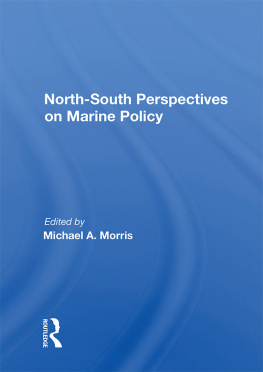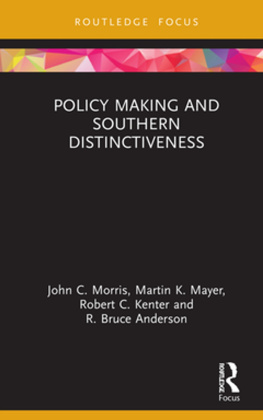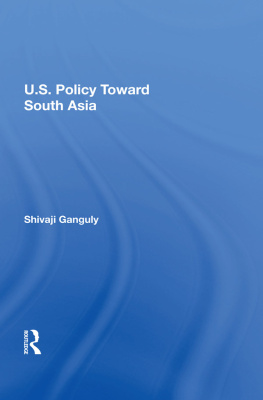First published 1988 by Westview Press, Inc.
Published 2018 by Routledge
52 Vanderbilt Avenue, New York, NY 10017
2 Park Square, Milton Park, Abingdon, Oxon OX14 4RN
Routledge is an imprint of the Taylor & Francis Group, an informa business
Copyright 1988 Taylor & Francis
All rights reserved. No part of this book may be reprinted or reproduced or utilised in any form or by any electronic, mechanical, or other means, now known or hereafter invented, including photocopying and recording, or in any information storage or retrieval system, without permission in writing from the publishers.
Notice:
Product or corporate names may be trademarks or registered trademarks, and are used only for identification and explanation without intent to infringe.
Library of Congress Cataloging-in-Publication Data
North-South perspectives on marine policy.
(Westview special studies in ocean science and
policy)
Includes index.
1. Marine resources--Government policy. 2. Marine
resources--Government policy--Developing countries.
I. Morris, Michael A. II. Series.
HC92.N67 1988 333.95'2 87-31711
ISBN 13: 978-0-367-01411-7 (hbk)
1
Introduction
Michael A. Morris
North-South Conflict and Cooperation at Sea
Management of the world's oceans is often competitive and untidy, because of the dynamics of national politics and the rudimentary nature of the international order. Ocean uses for both peace and war have increased, and membership of the international community has greatly expanded including attendant multiplication of competitive national marine policies. Every coastal country aspires to pursue national interests at sea through marine policy, which involves varying degrees of competition with well over a hundred other coastal states. In addition, land-locked states, most of which are in the Third World, acquired greater influence in ocean affairs through the Third United Nations Conference on the Law of the Sea (UNCLOS), 1973-1982.
International pressure may be exerted in a variety of ways by one state on another to alter national marine policy, but the backdrop for conflictive interaction between countries in the realm of ocean affairs is naval power. New weaponry technologies have enhanced the destructive power of established navies and have become more accessible to Third World navies. The superpower naval arms race, to which various alliance members make important naval contributions, continues unabated. The proliferation of independent Third World states in the postwar period brought in its train a belated awareness of the promise of offshore resources and
UNCLOS did alter the overall context of ocean politics, especially by codifying a global consensus about expanded national ocean zones. General agreement was reached on expanded national ocean zones including a 12-mile territorial sea, over which coastal states are sovereign save for a foreign state right of innocent passage, and a 188-mile exclusive economic zone (EEZ) further seawards where coastal states have jurisdiction over natural resources and related matters.
However, UNCLOS did not resolve a fundamental split between developed and developing states over the deep seabed, which is located seawards of the national ocean zones. The United States and a few other developed states have refused to sign or ratify the 1982 UNCLOS Convention because of its deep seabed provisions restricting private mining enterprises. After long resistance, the developed states did accept expanded national ocean zones. In contrast, the developing countries of the Third World were the original instigators of expanded national ocean zones, and they also championed an international deep seabed regime at UNCLOS.
Military competition at sea fell largely outside the aegis of UNCLOS, so East-West naval rivalry continues unabated. This conflict pits most of the First World or West (United States, Western Europe and allies) against the Second World or East (Soviet Union, Eastern Europe and allies).
The two major power blocs (East and West) include most of the developed states, and are referred to collectively as "the North." Usually the Third World or "the South" includes developing countries in Africa, Asia, Latin America and the Middle East, although there is some ambiguity about membership of a few countries in this grouping such as Israel, South Africa and Turkey.
North-South relationships in the new ocean setting often remain troubled. UNCLOS did help defuse the protracted North-South confrontation over expanded national ocean zones, but did not ease the counterpart confrontation over the deep seabed. Friction between developed and developing states at sea continues to be fed by numerous marine as well as non-marine causes. There are nonetheless new opportunities for North-South cooperation including assistance from developed states to help exploit and protect expanded Third World ocean zones.
A number of factors condition the evolving balance between the cooperative and conflictive dimensions of North-South marine relations. The cooperative and conflictive dimensions interact on both the domestic and international fronts.
Domestic politics is generally much more orderly than international politics, because of centralized power and law enforcement at the national level. Multiple ocean uses in coastal areas still pit a variety of domestic interests against one another. While governments can impose solutions on competing domestic actors when necessary, even authoritarian governments often prefer not to do so. Complex disputes do not generally admit of clear-cut solutions and in any event we 11-entrenched domestic actors will continue to pursue their interests on multiple fronts. A recurring tendency for governments is then to defer definitive resolution of domestic disputes as long as a crisis does not arise.
Less efficient governmental institutions and procedures in the South than the North tend to magnify these chronic domestic policy dilemmas. Polities in the South are also generally less stable than those in the North as well as being suspicious of any Northern involvement in their domestic affairs. Even in the best of circumstances. Northern assistance to Southern marine policies will face formidable political and economic obstacles.
North-South marine disputes pose yet additional problems. The domestic policy process generally does not place high priority on reconciling national interests with those of other nations even when foreign policy implications are inevitable, unless serious international complications arise. Since domestic and international affairs, including marine policy, are increasingly interdependent,the other. The generally troubled nature of North-South relations tends to accentuate these recurring problems of international relations. For example, Southern concessions to the North, even if reciprocated, will usually evoke hostile nationalistic feelings at home.
Marine policy does attempt to resolve numerous disputes within and between multiple ocean uses domestically as well as internationally, and thereby encourage more rational, systematic management of the oceans. Unfortunately, the strong conflictive dimension of North-South marine relations tends to overshadow the cooperative dimension.











